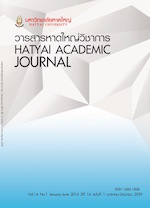กลยุทธ์การจัดการโซ่อุปทานอุตสาหกรรมอาหารฮาลาลของไทย: กรณีศึกษาอุตสาหกรรมอาหารทะเล
Main Article Content
Abstract
อุตสาหกรรมอาหารฮาลาลเป็นภาคธุรกิจที่มีความสำคัญอย่างมากในปัจจุบัน เนื่องจากทั่วโลกมีชาวมุสลิมมากกว่า 1,654 ล้านคน มีความต้องการอาหารฮาลาลมูลค่าสูงถึง 150,000 ล้านเหรียญสหรัฐต่อปี ซึ่งนับว่าเป็น จำนวนเงินมหาศาล แต่ประเทศไทยซึ่งเป็นผู้นำด้านการผลิตอาหารส่งออกอาหารฮาลาลเพียงปีละ 0.1% ของมูลค่าทั้งหมดซึ่งเป็นสัดส่วนที่น้อยมาก จึงนับได้ว่าผลิตภัณฑ์อาหารฮาลาลของไทยยังมีศักยภาพในการขยายตลาดต่างประเทศ งานวิจัยนี้เป็นการวิเคราะห์ ถึงจุดแข็ง จุดอ่อน อุปสรรค และโอกาส ของอุตสาหกรรมอาหารฮาลาลของไทยในมุมมองของกิจกรรมโลจิสติกส์ โดยทำการเปรียบเทียบกับการดำเนินงานฮาลาลโลจิสติกส์ของประเทศมาเลเซีย รวมถึงพัฒนากลยุทธ์ในการปรับตัวของอุตสาหกรรมอาหารฮาลาลของไทยให้เติบโตอย่างยั่งยืน
The Halal Supply Chain Strategies for the Thai Halal Food Industry: A
Case Study of the Seafood Industry
At present, the halal food industry is a crucial business. Since the population of Muslim who consume the halal food is more than 1,654 million, accounting for US$150,000 million per year. Thailand, a leading food manufacturing country, exports only 0.1% of the halal food. Therefore, it is an opportunity to increase the market share for Thai halal food. This research is attempted to analyze the strengths, weaknesses, threats and opportunities of Thailand’s seafood industry logistically by comparing its halal food industry with Malaysia’s halal food industry. Finally, significant halal supply- chain strategies are proposed to improve the Thai seafood industry.
Article Details
All published articles are evaluated by three qualified peer reviewers from various institutions through a double-blind process, where reviewers do not know the authors’ identities and authors do not know the reviewers’ identities. The content and articles in the Hatyai Academic Journal reflect the authors’ views only and are neither the opinions of the editorial board nor the responsibility of Hatyai University. The Editorial Board of the Hatyai Academic Journal allows articles to be reproduced for academic purposes, on the condition that the original source is clearly cited.


